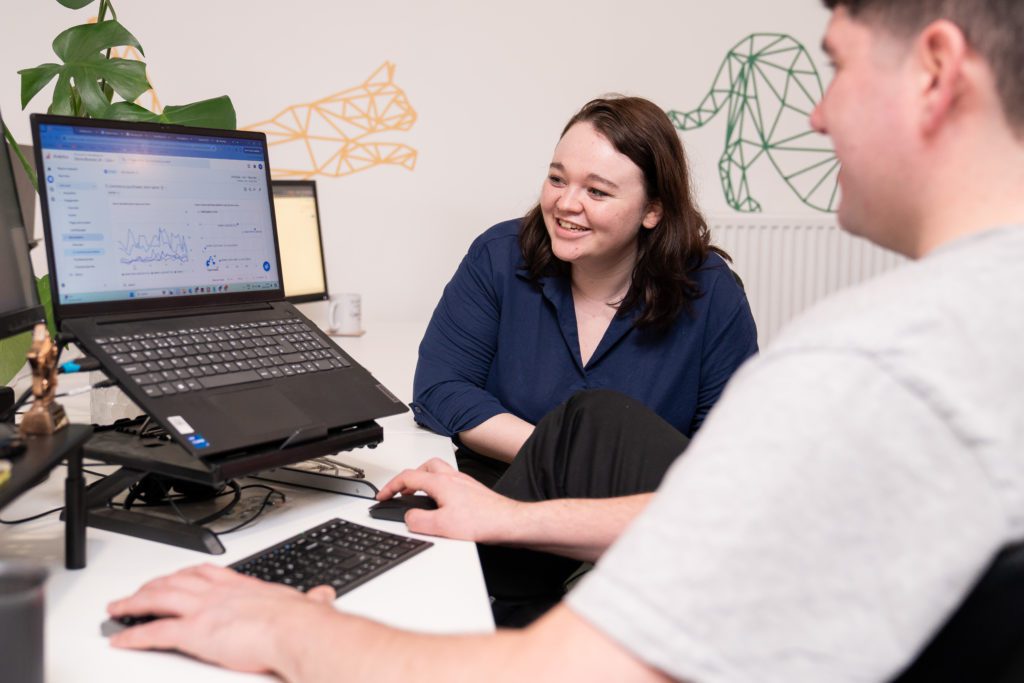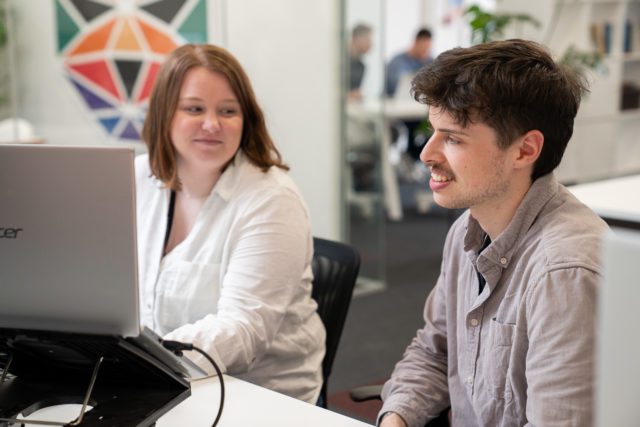If you own a website, or you’ve sat in on a marketing meeting, you have heard people talk about ‘keywords’, and why keywords are important to SEO. However, if you are unfamiliar with keywords, then you might be wondering how they are so important to a website’s rankability, and what makes words ‘key’ at all.
A ‘keyword’ is any word that you aim to be the main topic of the content that is present on a webpage or website. This word is typically identified before content is created, and it is strategically placed within key areas of the text. This may include areas such as the introduction, headers, or titles to help the page be found for that keyword when that keyword is searched online.
You ought to research these vital keywords before you start writing to help your content fit a market gap.
Here at Wildcat Digital, we deal with keywords every day. So, in our ongoing effort to help our clients better understand keywords and their importance, we thought that we would turn the spotlight on one of the most important factors of online marketing: the keyword.

Keywords are perhaps one of the most important factors in SEO strategies. At its heart, SEO is an attempt to get search engines to find key strings of text on a website or webpage, and consider the content on that page to be the direct answer for a search query.
To help illustrate my point, let’s take a closer look at how Google works on a basic level.
Let’s say that we simply want to find out ‘how to start a career in digital marketing’. In this instance, we may want to use Google for our answer.
This search offers us useful articles, frequently asked questions, and resources around our chosen topic. However, how does Google know to serve this information in the first place?
Keywords play a vital role in identifying resources available online to help fulfil this search query. Google is essentially serving us the content which has the words from the search term in the content it ranks. This makes us consider the words in our content as the ‘key’ to getting this content to rank well on Google.
By serving useful content to the searcher, Google is doing its job by serving its users with useful content online.
However, this probably isn’t that surprising to you at this point. It is likely how you found this article in the first place.
Let’s take a closer look at how keywords played a role in presenting these results to Google users by looking at the content provided through just one of the results from Google’s Index.
Upon opening the page, we can see that the text features our query ‘How Do I Start a Career in Digital Marketing?’ at the very top of the page. Looking closer, we can see that this piece of text has been enriched with a special tag, known as a <h1> tag. This gives search engines a key identifier that the content (in this case, our Header 1 or Page Title) is key to the nature of the content below.
We can consider ‘How Do I Start a Career in Digital Marketing?’ our main keyword, in this case. However, we may also consider ‘start a career’ or ‘career in digital marketing’ to also be keywords in this case, as they are directly written in the <h1>, too.
When we Google this keyphrase, our article pops up on Google Search, offering information to our visitors and we achieve our goal of offering this information. Google also has provided a good resource to its users.
Keywords, in many ways, are a language that is used between content creators, businesses, website owners, webmasters, or forum users and search engines to help serve information to web users.
Keywords improve SEO by allowing written text to be a simple interface between user and software. If SEO is a human instruction to get Google to show my webpage to its users, I have to give it (Google) some indication that I want it to do so.
It’s odd, but Google or AI actually doesn’t understand any query that is searched online. These tools simply convert what you have written into binary – a string of 1s and 0s – and compare this string to strings which exist within their databases.
Once this string is matched up, or the string of data is comparable to a similar string, then Google returns data from its database based on this query/ string.
As you can imagine, the internet is pretty big, so it makes sense for all parties to enrich certain strings with a higher priority than others to make these tasks quicker, easier, and more precise. This priority is essentially what we mean by ‘key’ when we talk about ‘keywords’, and making web search quick, easy and efficient is how SEOs make a living.
Review our Case Study: Achieving A 100% Increase In Keyword Rankings Through Content Seo
Once the main title of your page has been enriched with a keyword. You can then identify and enrich other areas on the content of the page, such as <h2>s, <h3> etc. and within the text itself.
Exact keyword placement isn’t the same for every site or page. There is no number of keywords that you can insert into a page that will get it to rank above other similar pages. It also isn’t the case that more keywords are better than fewer.
What is clear is that keyword placement ought to be natural to the text beneath it, but you can get creative with wordings to help squeeze in keywords using a creative use of language.
In this section of the blog, I am writing whilst bearing in mind that one of my keywords is ‘are keywords important’. This informed the header of this section ‘Where Else Are Keywords Important?’.
Perhaps it would be more grammatically correct to head this section with ‘Where Else Can You Use Keywords’, but that exact phrase doesn’t contain my keyword. It’s a balancing act between well-written content and SEO factors such as keywords.
So, keywords are important to content online as it helps align content and search terms. But where do we find keywords in the first place?
As keywords are used to help search engines find content, products, services or snippets of information, they are used by marketers as a part of SEO strategies. In fact, SEO is vastly dependent on keywords, as these are the first aspects of a webpage or website when we are ‘optimising’.
As SEO is a branch of marketing, it is best to base your strategy around keywords and the marketing possibilities that they present.
In this section, we will use a powerful marketing tool called Semrush to find keywords and decide on whether to target them based on the frequency at which they are being searched (search volume) and current usage online already (keyword difficulty). You can also see if that keyword is currently being targeted by PPC campaigns and roughly the cost of targeting that keyword in dollars per click.
Later, keyword intent will also play a vital role in selecting our keyword, as modifiers such as ‘where’ and ‘how’ will change the style of result that Google returns to us. For instance, if you search ‘how to apply for a job in SEO’, you are looking for advice on the matter in blog form. Compare this to the intent behind the search ‘apply for SEO jobs’ may bring you a careers page.
Semrush breaks down its keywords into 4 categories, for which searches may look like:
Picking keywords is a compromise between high search volume with a high possibility ranking, but we also need to ensure that the intent behind our keywords is fit for our purpose, too.
Writing a blog optimised with the keyword ‘buy Semrush’ wouldn’t yield many views, as its purpose doesn’t align with the user’s intent.
Using Google Search Console (GSC) is a free way to find keywords for which your content is starting to rank.
Adding GSC to your domain allows you to view the amount of clicks and impressions that your website is receiving for certain queries online. Impressions are a measurement of how often your site is being viewed, but not clicked on, within Google’s search results. Clicks are the number of times users have clicked through to your page, equating a click to a visit.
Using these metrics, you can find keywords for which your page already ranks, but does or doesn’t receive a click-through. Understanding this can give you insight into which pieces of content (and therefore the keywords associated with the content) are receiving a high number of impressions, but receiving a small number of clicks, and consider it for re-optimisation.
We research our market by simply typing into Semrush some queries around the topic of finding a job in SEO. Here are our results.
We can see our keywords in the left-hand column, and then ‘keyword intent’ shows that we currently are researching keywords with ‘Informational’ or ‘Commercial’ intent.
Next is our keyword volume. Depending on which tool you use, and from which dates you select, you get an estimate of the number of searches these keywords get across multiple online platforms such as Google over that set period. If we want to write content or display a product to people online, then surely it would be best to target the keywords with the most search volume.
Unfortunately, the ‘KD%’ column brings the keywords into focus. ‘KD%’ is known as ‘keyword difficulty’, and it is a metric that shows how difficult it may be for you to rank for this keyword based on existing market competition and positions. A higher KD% indicates that the keyword will be harder to rank for than with a lower KD%, with ‘harder’ meaning that the keyword is already being targeted regularly by big players in that particular marketing niche.
What we are searching for is ‘low hanging fruit’, or viable gaps in the market where search is high, but results are attainable.
At this point, our research doesn’t present us with a viable marketing strategy based on our desired outcome. We need to continue to research and find a marketable gap in the market.
Looking again, we may want to opt for the keyword ‘how to get into marketing’ as this presents us with the largest market of searchers, and therefore the largest pool of potential customers we can market our product to. However, with a difficulty of 42%, there may be an easier path to getting our product or page seen.
Let’s take another look at Semrush.
Broadening our scope slightly, asking questions and changing the length of our keywords presents us with further opportunities.
We can now select a combination of these keywords which match our intent, and our ability to rank, and we can also see an estimate of the volume of searchers per month that we are targeting.
We can now save and combine a mix of these keywords into our content strategy, and use it to inform the creation of usable marketing content.
For the most part, yes, keywords have to be exact. However, as Google uses Semantic Search, you have a little wiggle room. As a rule, you can add words such as ‘a’ and ‘the’ to your keyword and still target them effectively. In this case, if there is volume behind ‘how to get job SEO’, then using ‘how to get a job in SEO’ as one of your keywords will likely yield results.
As search queries aren’t always written in good, clear English, SEOs often need to get creative with how they use keywords so that search engines can match up their index of content with the search term from the user.
Looking at our initial research again, we can see that we have some volume behind the keyword ‘how to get into digital marketing UK’. As this isn’t a natural use of English, we can change this keyword slightly for use in one of our key identifier locations (title tags, <h1> tags, introductory sentences etc.) to ‘how to get into digital marketing in the UK’.
This will be semantically understood by the search engine, and it will allow us to target the users who search for this keyword effectively. However, your keywords only need to be contained within your content, generally.
Whilst working in SEO is often a combination of writing, research and online technical development, at its heart, SEO is an attempt to use words and phrases to show search engines a product, service or piece of information. Creating these clear signals allows your intended audience to find your content, and then act how you want them to act. Taking a wider view, we essentially want web users to find us, and then complete our business objective, whatever that may be.
We need to use keywords sparingly as Google and other search engines can tell when keywords are crammed into content to attempt to ‘black hat’ the system. Google details this in their Spam Policy.
Cramming keywords can also lead to the user becoming alienated from your content or resource, too. You can often see this yourself when shopping online and less-than-scrupulous retailers have crammed their content full of inorganic keywords. The content is awkward, and users are less likely to ‘convert’ than with useful, well-written content.
Read up more on how to avoid keyword stuffing with our blog How to Avoid Keyword Stuffing – Keyword Best Practices.
Best practice dictates that keywords should be placed within the opening sentence of the text, as well as being used, where necessary, throughout the text as a whole.
This may mean that you may only mention the keyword in your <h1> and <h2>, plus once each below the headers themselves. This may be enough to get your page ranking within the top 10 results on Google.
More isn’t always more, and you can’t simply add your keyword over and over again and expect Google to rank you above your competition. As mentioned above, Google will actually negatively rank your page if you attempt to stuff your page with keywords, according to their Spam Policy.
For more information on how many keywords are the best for your content campaign, why not read our blog How to Avoid Keyword Stuffing – Keyword Best Practices?

Wildcat Digital is an SEO agency based in Sheffield. We work with local, national and international businesses, helping them harness keywords and punch above their weight online.
As an agency, we conduct keyword research every day. We also monitor the performance of the content that we create and report to our clients on the improvements that these changes have made for their businesses.
For more information on the benefits that SEO has brought our clients, why not check out just some of our best campaigns through our case studies?
If your business needs a hand with finding and using the right keywords, then don’t hesitate to get in contact with our SEO department today.

Founder
Our founder, Will Hitchmough, worked at a number of high profile Sheffield Digital Agencies before founding Wildcat Digital in 2018. He brings an extensive knowledge of all things related to SEO, PPC and Paid Social, as well as an expert knowledge of digital strategy.
Digital Marketing can be a minefield for many businesses, with many agencies ready to take your money without knowing how to deliver results. I founded Wildcat Digital to deliver digital success to businesses with smaller budgets in a transparent way.

Head of Growth
Rich joined us in May 2024 to head up our growth team. With years of experience helping other agencies to grow, Rich joins us at an exciting time as Wildcat is working on a five-year plan to become one of the biggest agencies in the UK.
Outside of work, Rich is a father to three children, which keeps him very busy! He’s also recently started running again to keep fit and loves a bit of DIY.

Head of Digital
Sarah joined Wildcat in January 2025, bringing over seven years of SEO expertise to the team. With a background in Fashion Communication and Promotion, she has worked both in-house and at agencies, covering a range of digital marketing specialisms before focusing on SEO.
Passionate about all things search, Sarah thrives on helping brands grow their online presence.
Outside of work, she enjoys walking her dog, running, and shopping for vintage clothing.

Office Manager
Amelia joined Wildcat Digital in January 2025, bringing extensive experience in HR, Health & Safety, Facilities Management and IT Support. Previously an Operations Manager at The University of Sheffield, she has a strong background in creating efficient and well-organized work environments.
Specialising in HR, Health & Safety, and Facilities Management, Amelia ensures the Wildcat Digital team has the resources and support needed to thrive. Whether managing office operations, maintaining compliance, or fostering a positive workplace culture, she keeps everything running smoothly.
Outside of work, Amelia loves trying new things, traveling, camping, and walking. She also enjoys socialising and exploring new places with friends and family. Her adventurous spirit and proactive approach make her a valued member of the team.

Client Success Coordinator
Siena joined us in 2023 with a background in sales and digital marketing. She leads on client relationships across the company, ensuring that our customers are happy throughout their journey with us, from their initial consultation through to onboarding and beyond.
Outside of work, Siena enjoys travelling and getting stuck into the local culture. She likes to make the most of her experiences and particularly enjoys watching sunrises and sunsets from beautiful locations around the world.

SEO Account Director
Paul has a strong background in SEO, having previously founded and ran a successful eCommerce business, as well as running a personal blog that achieves an average of 17K users per month. Paul’s knowledge of SEO is extensive, with a strong emphasis on client handling and technical SEO.
Outside of work, Paul enjoys spending time with his family and staying active with weight lifting and combat sports.

Team Lead & Technical SEO Account Manager
With a degree in Computer Science and SEO experience dating back to 2017, Dariusz has a wide range of SEO skills and knowledge. His specialist knowledge of Technical SEO has firmly landed him the title of Wildcat’s Technical Wizard, and he has recently taken on the responsibility of Team Leader for the Panthers Team.
In his spare time, Dariusz loves hiking, experimenting and trying new coffees and loves learning new things. He is currently learning more about CRO and AI and how this could benefit our clients.

Team Lead & Senior SEO Account Manager
With a background in sales, Molly is a natural Account Manager, brilliantly handling any issues that come her way. Having joined us as a Digital Marketing Executive, and working part-time through her final year of University, Molly is a shining example of how hard work pays off. She is now an SEO Account Manager with a particular interest in Content and Client Management.
In her spare time, Molly loves to get out in nature, hiking and exploring the Peak District. She also loves cooking and likes to unwind with a bit of yoga.

PPC Team Leader
Libby joined Wildcat in 2021 as our first PPC hire. With a degree in Digital Media Production, a Master’s in Digital Media Management and previous experience in Social Media Management, Libby hit the ground running and has since climbed the ranks to Senior PPC Account Manager and has a particular interest in the eCommerce sector.
Outside of work, Libby likes gaming, and cooking and likes to keep active by lifting weights.

Senior SEO Account Manager
With a degree in Film and TV production, and a varied career history, Jamie made the move to marketing with a Masters degree in Digital Media Management. He has since worked in SEO at Agencies across Sheffield, before joining Wildcat and working his way up to SEO Account Manager. Jamie has a particular interest in backlinks and Digital PR and has recently gained a client a valuable backlink from Forbes!
In his spare time, Jamie is an avid foodie and loves trying new restaurants and cuisines. He also loves to travel and spent a year travelling to Australia after university.

SEO Account Manager
Jasmine joined Wildcat in 2022 with a strong background in SEO and Account Management. At the time, she was finishing up a Level 4 Apprenticeship in Digital Marketing from the Chartered Institute of Marketing, and has since worked her way up to SEO Account Manager. Jasmine excels at content writing and promotion, and particularly enjoys finding creative ways to join the dots on multi-channel campaigns.
In her spare time, Jasmine volunteers at a charity, helping combat loneliness & social isolation experienced by older neighbours. Outside of Wildcat, she owns a catering company, Savery Grazing, creating delicious grazing tables & platters for a range of events. She also loves skiing and exploring the Peak District.

Senior SEO Executive
After spending ten years managing businesses, restaurants, cafes and event spaces across Sheffield, Jon decided to change careers and joined Wildcat as an SEO Executive in 2022. He especially enjoys the client management side of the job, helping them to understand digital marketing and ways in which they can build their business’s presence online.
Outside of work, Jon likes to keep fit with running, badminton and football, and also loves music.

Senior SEO Executive
Andy joined Wildcat in 2023 after starting his digital marketing career in-house for a local Sheffield company. Since joining, he has developed a strong interest in Technical SEO and has strong skills in Account Management.
Outside of work, Andy loves music and plays in a couple of bands. He also enjoys rock climbing, cycling, photography and good food.

PPC Executive
Before joining Wildcat, Tom worked across different industries, building skills in sales and customer service. He later developed a passion for digital marketing whilst working on personal marketing projects and freelance ventures, and gained numerous certifications in PPC and Social Media.
Outside of work, Tom enjoys staying active by going to the gym and hiking. He also loves travelling and motorbiking.

Senior SEO Executive
Kezia joined us in July 2024 after completing a CIM Certificate in Digital Marketing and gaining experience in Content SEO at another Sheffield agency.
In her spare time, Kezia loves to get outdoors, bouldering, hiking and travelling.

Senior PPC Executive
Alex joined Wildcat Digital in December 2024 as a Senior PPC Executive, bringing a strong background in Paid Media, Paid Social, and Programmatic advertising. With a degree in Business & Marketing and Google Ads certifications, she has the expertise to craft high-performing campaigns that drive results.
Before joining Wildcat Digital, Alex worked at two leading agencies in Leeds, honing her skills across various digital advertising platforms. Her analytical mindset and strategic approach help businesses maximize their online presence and advertising budgets.
Outside of work, Alex enjoys spending time with her dog, Lola, and going on walks with her dog walking group. She’s also a keen footballer and loves playing five-a-side whenever she gets the chance. Her enthusiasm and team spirit make him a great addition to the Wildcat Digital team.

SEO Executive
Amy joined Wildcat in 2024 with a background in journalism, having worked as a News Editor and Editor-in-Chief at The Sheffield Tab. She is naturally interested in Content SEO and research, so will no doubt prove to be a content power-house.
In her spare time, Amy loves watching crime shows, listening to music and hanging out with her dog, Eddie!

SEO Executive
Reiss joined the Wildcat Digital team in July 2025, with a background in journalism and digital content, Reiss brings both creativity and technical know-how to the team.
After graduating with a Journalism Studies BA from the University of Sheffield, where he also served as Games Editor and Deputy Editor for the student-run newspaper – Reiss jumped straight into the world of climate tech communications.
Outside of work, Reiss loves crochet, swimming, playing guitar, and diving into both video and board games. He’s always up for picking up new skills and trying new things – which makes him a perfect fit for our team!

Content & Proposal Writer
Liv joined the WildcatDigital Team in June 2025, with a strong background in financial admin and client care, Olivia is taking an exciting step into the creative world – and we’re so glad she’s doing it with us!
She’s currently studying content creation through her apprenticeship with Wildcat, and already bringing fresh energy and creativity to the team.
Outside of work, Olivia runs her own BIAB nail business, loves reformer Pilates, long walks, and is a member of a competitive dance team.

January 26, 2026
We made it to the end of January! One month into 2026, and it feels like a lot has changed.…

January 23, 2026
Many businesses assume that Author and Meet the Team pages are simply a nice way to showcase the people behind…

December 17, 2025
As we enter into 2026 and reflect back on the year as business owners and digital marketers, we can’t help…